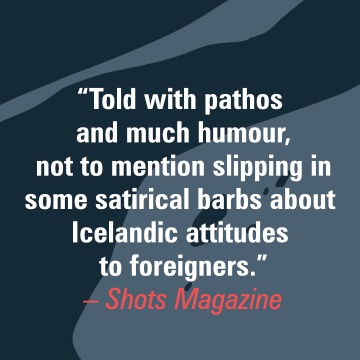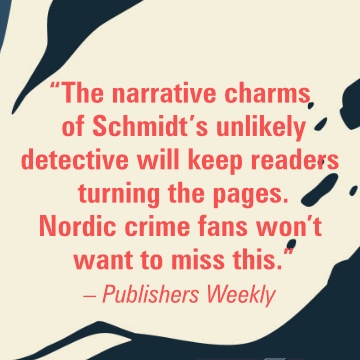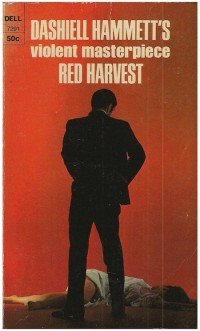
 Along with Sam Spade, there is hardly a more iconic character in crime fiction history than the aloof yet resolute private eye The Continental Op. And both are the creation of Dashiell Hammett, best known internationally as the author of the Maltese Falcon.
Along with Sam Spade, there is hardly a more iconic character in crime fiction history than the aloof yet resolute private eye The Continental Op. And both are the creation of Dashiell Hammett, best known internationally as the author of the Maltese Falcon.
Hammett, along with fellow pulp fiction writers James M Cain and Raymond Chandler, set the standard for the hardboiled private eye as born in the pages of the pulp fiction magazine Black Mask in the 1920s. But The Op is as hard as they come. Like many other tough-guys of crime fiction, he is inured to violence. But he is also ammoral and exhibits a distinct lack of compassion tempered with wry humor. This darkly alluring combination of qualities and Hammett’s concise writing style makes for a reading experience that is thrilling and unforgettable. So ground-breaking was the Op, it’s been argued the hard-boiled pedigree of Chandler’s Philip Marlowe and MacDonald’s Lew Archer owe their existence to his influence.
Nevertheless, thanks to Hollywood, the Op is often eclipsed by the other iconic private detectives Sam Spade and Nick and Nora, so we’ve decided to focus on Hammett’s no-named anti-hero. The Continental Op first appeared in 1923 in the Black Mask story Arson Plus. The Op’s adventures continued in a series of 33 other stories serialised in that magazine. These stories later formed the basis of novels like The Dain Curse and The Glass Key. But it is the bloody brilliant Red Harvest to which we now turn.
The city of Personville (or ‘poisonville’ as it’s aptly pronounced by its natives) is a tough urban jungle where violence has as much currency as dollars or an informant’s whisper. Into this corrupt quagmire, where the only difference between the cops and crooks are their uniforms, calmly strides the Continental Op. The Op, a private eye from the San Francisco branch of the Continental Detective Agency, has been summoned to the town by newspaperman Donald Willsson, who is not at home when the Op meets his appointment. When the client’s wife suddenly steps out after a phone call, she returns soon after visibly shaken, her shoe stained with what looks like blood, and announces that her husband won’t be making his appointment after all.
Sure enough, Donald Willsson turns up dead shortly afterwards, shot to death. With his client murdered, the Op eventually interviews the man’s father, Elihu Willsson, who is the head of the town. The reader tags along to solve the murder, but also to determine the true motivations of the hardboiled Op. Although this is a first-person narrative, and a darkly funny one at that, the Op is as mysterious as the cases he seeks to close. One thing we do learn, however: He takes it personally when someone tries to kill him, especially when it’s the chief of police.
The industrialist don of Personville wants to clean up the mining town he built up, which is in the grips of the same thugs he brought in to chase out the unions, but who have now taken over, aided and abetted by the police. When the Op solves the case of his murdered son, Williamson then tasks him with breaking up the control wielded by the three major goons running things. There’s the dangerous bootlegger Pete the Finn, the suave pinochle-playing Max Thaler AKA Whisper, and burly gangster Lew Yard. The Op’s only condition for cleaning house, besides $10,000, is that he is given free reign to do it his own way.
He opts for dynamite, “something to blow them apart,” and it’s more than anyone bargained for. The Op arranges a pow-wow between the industrialist, the top gang heads and the police chief to hash things out. He then reveals to all present some pretty damning intel that implicates each of them. A bloodbath ensues as the Op masterfully sets the characters against each other, with the help of the brazen hussy Dinah Brand. The Op is immune to her sultry wiles, which she uses to squeeze all men in her orbit for their dough. She is quite open about her greed, but she makes a good drinking buddy for the Op. When things heat up between the warring mobs, the Op calls in reinforcements from the agency to keep an eye on things.
Before he is himself gunned down, chief of police Noonan invites the Op to participate in the massacre of Whisper and his men, who it’s said are holed up in a moonshine shack, which turns out to be a ruse. The following passage best illustrates the Op’s demeanor, his implacable nature, and the dark humor that pervades Red Harvest.
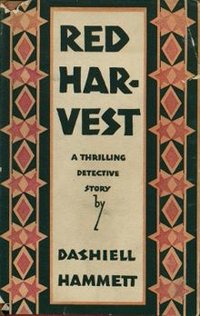 “The first floor was ankle-deep with booze that was still gurgling from bullet holes in the stacked-up cases and barrels that filled most of the house.
“The first floor was ankle-deep with booze that was still gurgling from bullet holes in the stacked-up cases and barrels that filled most of the house.
“Dizzy with the fumes of spoiled hooch, we waded around until we found four dead bodies and no live ones. The four were swarthy foreign-looking men in laborers’ clothes. Two of them were practically shot to pieces.
“Noonan said: ‘Leave them here and get out.’
“His voice was cheerful, but in a flashlight’s glow his eyes showed white-ringed with fear.
“We went out gladly, though I did hesitate long enough to pocket an unbroken bottle labeled Dewar.”
The Continental Op, ever the cool operator, plays them all with his trademark detachment. But now that he has stoked a gang war, the body count, starting with the police chief, gets so steep that it even begins to get under his thick skin — but not so much that he won’t lift a bottle of whiskey from the battlefield. The unruffled Op begins to be infected by the escalating violence of Poisonville, which threatens to turn him blood-simple. So he seeks a quick end to the mayhem. The only problem is that he wakes from a late night binge of liquor and laudanum to find the moll Dinah stabbed to death next to him, the ice pick they used for drinks protruding from her chest. Now he must finish what he started and still beat a murder wrap himself. But the carnage has just begun, as the Op is invited to yet another execution between mob leaders, and he barely escapes alive before he blackmails old Willsson to call in the National Guard already and officially call the corrupt town clean.
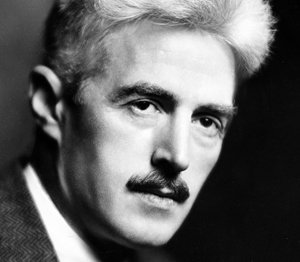 Originally serialised in Black Mask between 1927 and 1928, Red Harvest’s tale of politics and bloodshed is as much a revelation now as then, and is just as fresh and engaging, as Hammett, a former PI himself, brings a street-smart authenticity to his work. Still hugely influential in fiction and film (sit down this weekend and binge-watch Yojimbo, Fistful of Dollars, Last Man Standing, and Django Unchained if you don’t believe us), it is among the Mystery Writers of America top 100 crime novels of all time and easily made the top five books that got Zac Colbert into crime fiction, for one. Hammett (left) wrote clear and stark prose which was ahead of its time, creating an unforgiving world with psychological depth running through some thrilling set-pieces of violence. The world of the Op, darkly comical and overtly masculine on the surface, invokes a deep pathos of mythological proportions, told with a percussive conciseness that is enthralling to the point of addictive.
Originally serialised in Black Mask between 1927 and 1928, Red Harvest’s tale of politics and bloodshed is as much a revelation now as then, and is just as fresh and engaging, as Hammett, a former PI himself, brings a street-smart authenticity to his work. Still hugely influential in fiction and film (sit down this weekend and binge-watch Yojimbo, Fistful of Dollars, Last Man Standing, and Django Unchained if you don’t believe us), it is among the Mystery Writers of America top 100 crime novels of all time and easily made the top five books that got Zac Colbert into crime fiction, for one. Hammett (left) wrote clear and stark prose which was ahead of its time, creating an unforgiving world with psychological depth running through some thrilling set-pieces of violence. The world of the Op, darkly comical and overtly masculine on the surface, invokes a deep pathos of mythological proportions, told with a percussive conciseness that is enthralling to the point of addictive.
The deadpan Op, whose psychological fencing with high society and the underworld alike straddles the grey boundary between civilisation and the instinct to kill — is ever fascinating, and ever a page-turner. Not the least interesting still is the Op’s ambiguous motivation. Amidst the horror of murder, he calmly describes each corpse with the clinical detachment of a coroner, noting the angle of entry of gunshot and stab wounds, as he calculates his next manipulation. He relentlessly pursues, not justice exactly, and certainly not to right a moral wrong, and maybe not even a paycheck — but simply to close a case for The Agency without getting yelled at by his boss.
To read more about Black Mask, click here. For an interesting alternative take on Dashiell Hammett’s fiction have a look at Hammett Unwritten.






